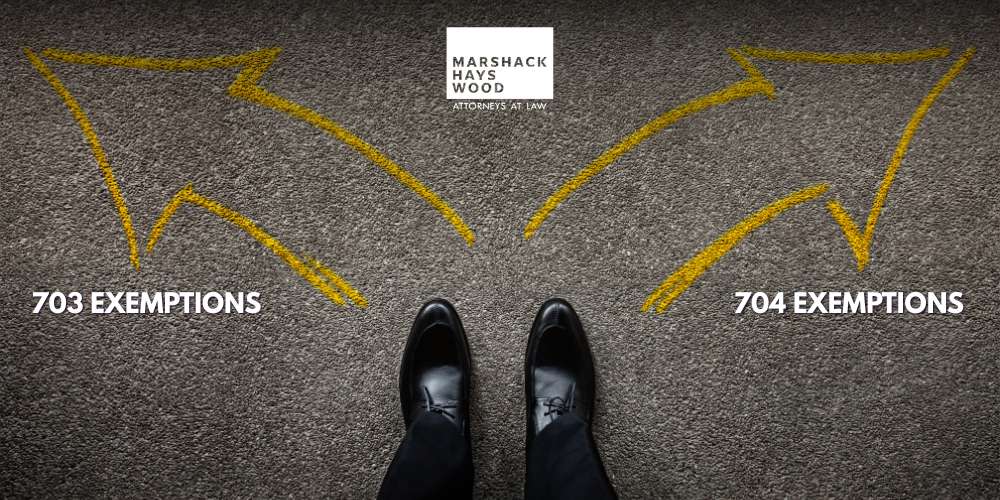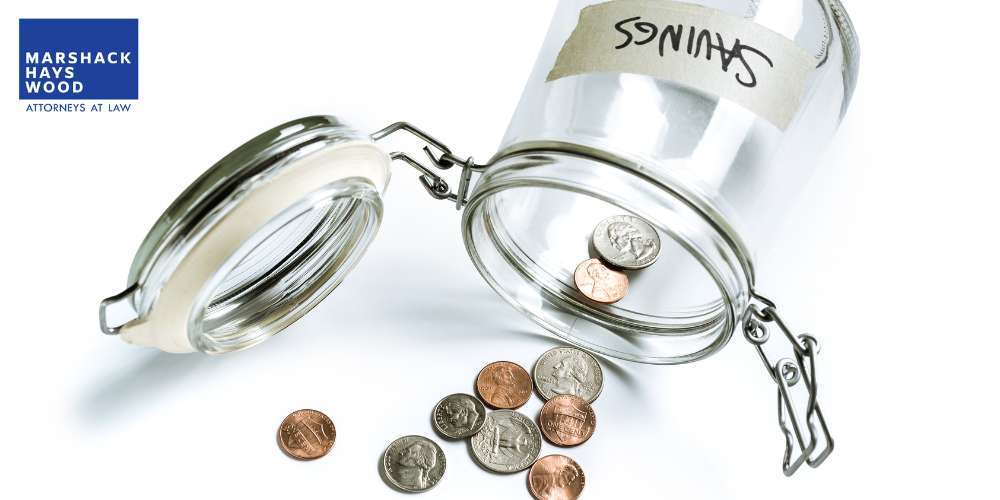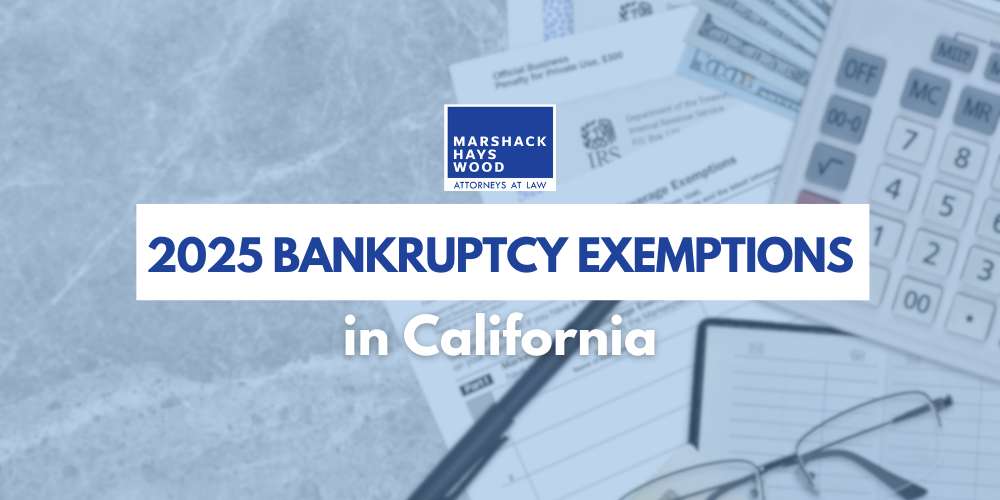Many people mistakenly believe that filing for bankruptcy means they will have to give up all of their assets. Fortunately, this is not the case. Many California filers can actually keep most, if not all, of their assets when they file. They can do so by utilizing California bankruptcy exemptions to protect their property. Bankruptcy exemptions protect a bankruptcy filer’s assets from being sold by the bankruptcy trustee to pay their creditors.
Before you file for bankruptcy in California, it’s important to understand which California bankruptcy exemption system to use for your case. By working with a skilled bankruptcy lawyer, you can choose between the two California bankruptcy exemption systems (703 and 704) and protect as much property as possible with those exemptions. The Orange County bankruptcy lawyers at Marshack Hays Wood LLP are here to help you make the most of your exemptions and save your assets from liquidation.
To schedule a consultation with us, please call our office at (949) 333-7777 or contact us online today.
How Do California Bankruptcy Exemptions Work?
Regardless of whether you file for Chapter 7 bankruptcy or Chapter 13 bankruptcy, you can protect your property with California exemptions. However, the two chapters treat nonexempt property a little differently. Nonexempt property is that which is not covered by bankruptcy exemptions.
In Chapter 7 cases, the bankruptcy trustee can sell nonexempt property and distribute the proceeds to the filer’s creditors. In Chapter 13 cases, you keep all of your property. However, you must pay the value of your nonexempt property’s equity or the value of your disposable income, whichever is greater. This amount will be paid in your Chapter 13 repayment plan.
Both chapters aim to ensure that the filer’s creditors receive the same amount no matter which chapter they file.

When Can You Use Bankruptcy Exemptions in California?
Importantly, filers must meet certain requirements before they can use California’s bankruptcy exemptions. There are also a few elements to remember about California exemptions. These elements are as follows.
- Filers must meet a residency requirement before they can use California bankruptcy exemptions.
- California does not allow filers to use federal exemptions.
- California does not allow joint filers to claim double exemptions.
We explain the above points in more detail in the following sections.
What is the Residency Requirement for California Exemptions?
Before you can take advantage of California’s exemptions, you must meet the state’s residency requirements. You must have lived in the state for more than 180 days before you can file for bankruptcy in California. To use California’s exemptions, you must have lived in the state for at least 730 days.
If you do not meet this requirement, you will use the exemptions from your previous state of residence or the state that you lived in for most of the 180 days before the 2 years before your filing.
Does California Allow Federal Bankruptcy Exemptions?
No. Many other states allow bankruptcy filers to choose between state and federal exemptions, but California does not. In most cases, you must choose between California’s two sets of bankruptcy exemptions. In rare cases, filers may be able to protect their property with federal nonbankruptcy exemptions.
Does California Allow Joint Filers to Claim Double Exemptions?
No. Each California bankruptcy exemption has a maximum dollar amount attached to it. In other words, property is only exempted up to that dollar amount. While federal exemptions allow married couples who are filing jointly to double their exemption amounts, California does not. Even if someone files joint bankruptcy when married in California, they may not double their exemptions.

The Two Sets of Bankruptcy Exemptions in California
The most important element of California bankruptcy exemptions is that there are two distinct sets of exemptions. They are referred to as “sets” or “systems” and one set is usually better than the other depending on the filer’s needs. You cannot mix and match exemptions from both sets.
Below are the updated exemptions for California in 2025.
System 1 Exemptions List (Section 704 Exemptions)
The first system, which has 704 exemptions, is usually a better idea if you own a home and have a decent amount of equity. This is mostly because of the substantially higher homestead exemption. These exemptions come from the California Civil Code of Procedure, Section 704. In the following sections, we outline the California 704 exemptions.
Homestead Exemption
The homestead exemption protects equity in your primary residence. You can exempt up to $361,076 or $722,507, depending on the average property value in your area. This exemption can apply to a home, boat, condo, mobile home, or community apartment as long as it is your primary residence when filing.
Motor Vehicle Exemption
The motor vehicle exemption protects equity in a car, motorcycle, truck, or other vehicle up to a certain amount. You can exempt up to $8,625 in equity for your vehicle.
Personal Property
You can exempt the following amounts for different types of personal property.
- Household and personal items
- Health aids
- Building materials for repairing or improving the residence up to $4,400
- Jewelry, art, and other heirloom items up to $10,950
- Money in a deposit account up to $2,170
- Public benefit payments up to $2,175 per person or $3,250 for two or more payees
- Wrongful death or personal injury recoveries necessary for support
- Cemetery and burial plot
Wages
You can exempt up to $8,625 in unused vacation credits, vacation pay, sick leave, family leave, or wages.
Pensions and Retirement
- Tax-exempt retirement accounts
- IRAs and Roth IRAs
- Private retirement benefits
- Public retirement benefits
- Retirement and pensions for public employees, county peace officers, county firefighters, and county employees
Public Benefits
- Disability benefits and unemployment, as well as union benefits
- Public assistance benefits
- Relocation benefits
- Benefits from workers’ compensation
- Student financial aid
- FEMA benefits
Other Exemptions
- Tools of the Trade:
- This can include uniforms, books, tools, instruments, equipment, one commercial vehicle, and other items up to $10,950 per person or $21,900 if both spouses share the same trade
- Insurance Benefits:
- Unmatured life insurance policy up to $17,525
- Matured life insurance proceeds as needed for support
- Matured life insurance benefits if the insurance policy prohibits those benefits from being used to pay creditors
- Health insurance or disability benefits
- Homeowners’ insurance benefits for up to six months after they were received, up to the homestead exemption amount
- Fidelity bonds
- Other Miscellaneous Exemptions:
- Professional or business licenses
- Property involved in a business partnership
- Inmate trust account up to $2,175

System 2 Exemptions List (Section 703 Exemptions)
System 2 can be found under California Civil Code § 703.140(b). These exemptions can only be used in bankruptcy cases, not for other purposes. In general, this set is a better fit for those who don’t own property or who have very little equity in their home. In the following sections, we outline the California 703 exemptions.
Homestead Exemption
This can be a burial or homestead exemption. It protects up to $36,750 in equity for real or personal property that the filer uses as a residence.
Motor Vehicle Exemption
You can exempt equity up to $8,625 in your motor vehicles.
Personal Property
- Health aids
- Household items like clothing, books, instruments, furniture, appliances, and more up to $925 per item
- Wrongful death recoveries as needed for support
- Personal injury recoveries up to $36,750
- Jewelry up to $2,175
Wages
You can exempt up to $8,625 in unused vacation credits, vacation pay, sick leave, family leave, or wages.
Pensions and Retirement
- Tax-exempt retirement accounts
- Roth IRAs and IRAs
- ERISA-qualified annuities, pensions, and benefits as necessary for support
Public Benefits
You can exempt Social Security benefits, veterans’ benefits, unemployment benefits, crime victims’ reparation benefits, and other public benefit payments.
Wildcard Exemption
The wildcard exemption allows you to exempt up to $1,950 for any assets.
Other Exemptions
- Tools of the Trade:
- You can exempt tools of the trade up to $10,950.
- Child Support and Alimony:
- You can exempt child support or alimony payments as needed for support.
- Insurance Benefits:
- Unmatured life insurance policies
- Disability benefits
- Loss of future earnings as needed for support
- Accrued interest, cash, loans, dividends, or surrender value on an unmatured life insurance policy up to $19,625

How to Avoid Exemption Problems in California
Figuring out how to maximize your exemptions without violating state or federal law or losing property can be difficult. This is why we strongly recommend speaking with a qualified bankruptcy lawyer before you file bankruptcy. An attorney can help you choose the best exemptions set, maximize those exemptions, and protect your personal property.
While it can be easy to make a mistake with your exemptions, this does not automatically spell trouble for you. In general, you can exempt the property you need to maintain your household and your job, including clothing, furniture, and some equity in your vehicle.
After you choose your exemptions schedule, your court-appointed bankruptcy trustee will check your exemptions to ensure you can rightfully protect the property. If the trustee disagrees with your exemptions, they will file an objection with the bankruptcy court. Then, the bankruptcy court judge will determine whether or not you can keep the property.
However, objections from trustees are unlikely unless they suspect you of trying to take advantage of the court. Most likely, they will speak with you directly to try to resolve the issue informally.

Contact an Orange County Bankruptcy Attorney with Marshack Hays Wood Today
If you are considering bankruptcy but you’re unsure of where to begin or how to protect your property, the bankruptcy attorneys at Marshack Hays Wood are here for you. We have extensive experience helping clients with their bankruptcy cases, including the bankruptcy exemption process. Our team will guide you through the California bankruptcy process from start to finish, ensuring that you are always kept informed.
To schedule your consultation with an experienced Orange County bankruptcy lawyer, please call our office today at (949) 333-7777.

